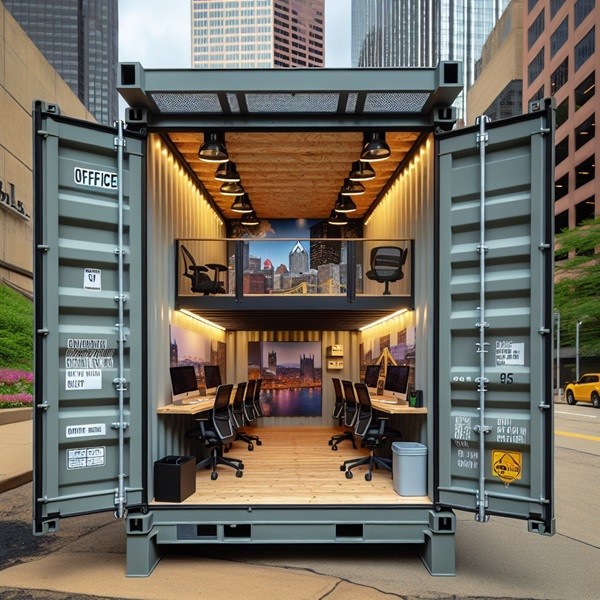
Key Takeaways
- Zoning laws in Pittsburgh may vary by district, so it’s essential to check local regulations before setting up a shipping container office.
- You’ll need a permit to convert a shipping container into an office space, and the requirements can be specific and detailed.
- Building standards and safety codes are in place to ensure that your shipping container office is safe and compliant with city regulations.
- Location is key when planning your shipping container office to ensure accessibility and compliance with zoning laws.
- Design and utility hookups like electricity and plumbing must be planned carefully to turn a shipping container into a functional office space.
Decoding Pittsburgh’s Shipping Container Office Regulations
When it comes to setting up a shipping container office in Pittsburgh, you’ve got to play by the rules. These steel boxes are all the rage for their durability and modularity, but they’re not exempt from the law. Let’s dive into the specifics and make sure your office doesn’t hit a snag with the authorities.
My Favorite Container Homes Resource
I compared the top 3 Container Home Guides
to discover the ultimate resource!
See my top recommendation here
Understanding Zoning Laws for Shipping Containers
First things first, you need to know where you can put your shipping container office. Pittsburgh’s zoning laws can be a bit of a maze, but here’s the deal: different areas have different rules. Some places are a no-go for commercial use, while others welcome them with open arms. So, you’ll want to check with the Pittsburgh Zoning Code and see what’s allowed in your desired spot.
Most importantly, don’t guess! A quick chat with the Department of City Planning will save you time and headaches. They’ll tell you straight up whether your spot is zoned right for a container office.
Because zoning laws are all about keeping the city organized and looking good, you might also have to think about how your container will blend in with the neighborhood. You don’t want it sticking out like a sore thumb.
- Check with Pittsburgh’s Department of City Planning for zoning information.
- Ensure the proposed location for your shipping container office is zoned for commercial use.
- Consider the visual impact of your container office on the surrounding area.
Permit Requirements for Container Office Conversion
Getting a permit is like getting a golden ticket – it’s your official go-ahead. In Pittsburgh, you’ll need to get this sorted before you start swinging hammers. The permit ensures that your container office meets all the necessary requirements and is safe to use.
Here’s the scoop on getting that permit:
- Fill out a Building Permit Application with the City of Pittsburgh’s Bureau of Building Inspection.
- Include detailed drawings of your container office plans. They want to see the big picture, including where doors and windows will go.
- Be ready to describe the materials you’ll be using and how you plan to hook up to utilities like water and electricity.
And remember, patience is a virtue here. It might take a little time to get that permit in your hands, so don’t plan on moving in next week.
Building Standards and Safety Codes Compliance
Safety’s no joke when it comes to your container office. Pittsburgh’s got a set of building codes that make sure everything’s up to snuff. These rules cover everything from structural integrity to fire safety and accessibility. You’ll need to make sure your shipping container office isn’t just cool, but also safe and sound.
Therefore, you’ll want to get familiar with the International Building Code (IBC), which Pittsburgh adopts, and any local amendments. These codes ensure that your office will be a safe place to work, and they’re not just suggestions – they’re the law.
Because you’re turning a shipping container – something that wasn’t originally meant to be an office – into a workspace, you’ve got to be extra careful. You’ll likely need to reinforce the structure, add proper
Here’s what you need to keep in mind:
- Structural integrity must be maintained or enhanced.
- Fire safety measures, including proper exits and fire-resistant materials, are crucial.
- Accessibility is a must – your office should be usable by people with disabilities.
By sticking to these guidelines, you’ll be setting yourself up for success and ensuring that your container office is a place where ideas can flow and business can boom, all while keeping everyone safe.
Essential Insulation Techniques for Comfort
Insulation isn’t just about staying warm; it’s about creating a comfortable workspace in your shipping container office. Pittsburgh can get pretty chilly, and you don’t want to be shivering during your workday. So, let’s get that container cozy. You’ll want to line the walls with a solid layer of insulation – think foam or fiberglass. This keeps the heat in and the cold out. Plus, it helps with soundproofing, so you can focus on your work without outside noise.
Utility Hookups: Electricity and Plumbing Basics
Now, let’s talk about getting your container office all powered up. You’ll need a reliable source of electricity for lights, computers, and all those gadgets that keep your business buzzing. Hooking up to the main power grid is usually your best bet. You might need to get an electrician to handle this part, because it’s important to do it right and safely.
Plumbing is another story. If you need running water or a bathroom in your office, you’re going to need some pipes. This can get a bit complicated, depending on where your container is located. Sometimes, you might be able to connect to existing sewer lines; other times, you might need to get creative with solutions like composting toilets.
Interior Design Considerations for Professionalism and Productivity
Your shipping container office isn’t just a box; it’s your business’s home. That means it needs to look the part. You’ll want to choose an interior design that reflects your brand and makes a good impression on clients and employees alike. Bright colors can energize the space, while a clean, minimalist look can keep things professional. And don’t forget about the furniture – ergonomic chairs and desks are a must for productivity.
Navigating Pittsburgh’s Permit Process with Ease
Let’s face it, nobody likes paperwork. But in Pittsburgh, getting a permit for your shipping container office doesn’t have to be a headache. The key is to stay organized and understand what’s expected of you. Start by gathering all the necessary documents – your site plans, design drawings, and proof of land ownership. Then, take a deep breath and dive into the application process. It’s all about ticking the right boxes and providing the information the city needs to give you the thumbs up.
Key Documents and Steps for Successful Applications
For a smooth permit application, here’s what you’ll need:
- A completed Building Permit Application form – you can get this from the Bureau of Building Inspection.
- Site plans that show where your container will sit on the property.
- Architectural drawings that detail the container’s transformation into an office.
- Proof of ownership or a lease agreement for the land where your container will be placed.
Once you have these documents, submit them to the city and wait for the review. If everything checks out, you’ll be on your way to opening the doors of your new container office.
Inspection Checkpoints: What to Expect
After you’ve got your permit, the city will want to check in on your progress. Inspectors will come by to make sure everything’s being done according to plan. They’ll look at the structural modifications, the electrical work, and the plumbing to ensure it all meets code. It’s important to be prepared for these inspections – have all your documentation ready and make sure the work site is safe and accessible for the inspectors.
These checkpoints are there to help, not hinder. They’re making sure your office will be a safe place for you and your team. So, welcome the feedback and use it to make your container office even better.
Overcoming Common Permitting Challenges
Sometimes, you might hit a snag in the permitting process. Maybe there’s a hiccup with your documentation, or perhaps the city has questions about your design. Don’t panic. The best approach is to stay calm, be responsive, and work closely with the city officials. They’re there to help, and they want to see your project succeed as much as you do.
If you do run into issues, consider hiring a professional who knows the ins and outs of Pittsburgh’s permit process. They can be a valuable ally in navigating any challenges that come up.

Maximizing Space: Ingenious Fit-Out Strategies
Shipping containers offer a unique challenge when it comes to space. They’re compact, which means every inch counts. But with some clever design, you can turn that metal box into a spacious and functional office. Start by thinking vertically – use shelving and wall-mounted desks to free up floor space. Then, look for multipurpose furniture that can serve more than one function, like a desk that turns into a meeting table.
Smart Storage Solutions for Limited Areas
Storage is crucial in a small space, but you don’t want it to eat up all your room. Here are a few smart storage solutions:
- Use floating shelves to keep supplies off the desk but within reach.
- Invest in under-desk cabinets that can hide away paperwork and clutter.
- Consider pull-out drawers that can be tucked away when not in use.
By getting creative with storage, you can keep your shipping container office tidy and organized, even when space is at a premium.
Another way to maximize space is to think outside the box – literally. If you’ve got the room, consider adding a deck or patio outside your container. It’s a great way to expand your workspace and enjoy some fresh air during breaks.
And don’t forget about lighting. Good lighting can make a small space feel bigger and more open. Natural light is best, so add windows where you can. For darker corners, LED lights are a bright and energy-efficient choice.
Flexible and Convertible Furniture Picks
Choosing the right furniture for your container office can make all the difference. Opt for pieces that are both functional and flexible. Here are a few ideas:
- A fold-down desk that can be tucked away when not in use.
- Rolling chairs and tables that can be easily moved around for different setups.
- A convertible sofa for quick meetings or a power nap.
With furniture that adapts to your needs, your container office can be ready for anything – whether it’s a day of focused work or an impromptu client presentation.
Implementing Technology for Maximum Functionality
Finally, let’s talk tech. In today’s world, a functional office is a connected office. Make sure you’ve got a strong Wi-Fi signal to keep your business online. Consider smart devices that can help manage lighting and temperature, making your office not just smart, but also energy efficient.
And since we’re in a digital age, think about how you’ll handle meetings and presentations. A good projector or a large monitor can turn a wall into a screen, and a quality sound system can make sure everyone’s heard loud and clear.
With these tips and a bit of planning, your shipping container office in Pittsburgh can be a cutting-edge space that inspires innovation and drives your business forward.
Comparison: Container Office vs Traditional Office
| Feature | Container Office | Traditional Office |
|---|---|---|
| Affordability | Generally more affordable due to lower construction costs | Typically more expensive due to higher costs for materials, labor, and land |
| Customization | Highly customizable with options for windows, doors, insulation, and more | Can be customized to specific needs but may require more extensive construction |
| Durability | Made of steel and designed to withstand harsh conditions | Durability varies with construction materials and methods |
| Portability | Designed to be transported and relocated as needed | Fixed in location and not designed to be moved |
| Setup Speed | Can be set up and ready for use quickly | Construction and setup generally take longer |
| Eco-Friendliness | Can be eco-friendly by repurposing used containers and using less material | Eco-friendliness depends on materials and construction methods used |
| Space Utilization | Space can be maximized with creative design; stackable for multi-level offices | Space utilization depends on design and may require more land |
| Energy Efficiency | Can incorporate energy-efficient features and renewable energy sources | Can be designed for energy efficiency with modern technologies |
| Safety and Security | Structurally strong and can be secured with lockboxes and steel screens | Security features can be incorporated but may increase cost |
| Flexibility | Modular nature allows for easy expansion or reduction of space | Less flexible; changes often require construction or renovation |
| Aesthetic Integration | May require modifications to blend with surroundings | Can be designed to integrate with existing architecture |
This table outlines the key features and considerations when comparing container offices to traditional offices, including aspects such as affordability, customization, durability, portability, setup speed, eco-friendliness, space utilization, energy efficiency, safety and security, flexibility, and aesthetic integration. Container offices offer a unique set of advantages that may be particularly appealing for businesses looking for cost-effective, flexible, and quick-setup office solutions.
References:
- How to Get the Most Out of Your Shipping Container Office – Westgulf
- Container Offices: Advantages and Disadvantages – Ofita
- Container Homes: Pros, Cons, & Cost Comparison – Kevin Liu on LinkedIn
- Using a Container Office – Britco
- Benefits of Using Shipping Containers as an Office – Conterm
Going Green: Eco-friendly Tips for Your Container Office
Being eco-friendly isn’t just good for the planet; it can also save you money in the long run. When it comes to your shipping container office, there are several green practices you can adopt to make your workspace more sustainable.
Energy-Efficient Heating and Cooling Practices
Insulation plays a huge role in keeping your container office energy efficient, but there’s more you can do. Consider using energy-efficient heating and cooling systems, like mini-split units, which can save energy and keep you comfortable year-round.
Advantages of Solar Panels and Renewable Energy Sources
Solar panels are a great investment for a container office. They can reduce your reliance on the grid and lower your electric bills. Plus, Pittsburgh gets plenty of sun, making it an ideal location for harnessing solar energy.
Rainwater Harvesting and Waste Reduction Techniques
Collecting rainwater is another smart move. You can use it for landscaping around your office or even for flushing toilets if you’ve got the plumbing set up. And when it comes to waste, think about recycling and composting to minimize what goes to the landfill.

FAQs
Got questions? You’re not alone. Here are some of the most common queries about setting up a shipping container office in Pittsburgh.
Are Shipping Containers Legal to Use as Offices in Pittsburgh?
Yes, you can legally use shipping containers as offices in Pittsburgh, but you must comply with all zoning and building regulations. Always check with local authorities before proceeding.
How Long Does the Permitting Process Take for Shipping Container Offices?
The permitting process can vary in length, but it typically takes several weeks. It’s best to apply as early as possible and ensure all your documentation is in order to avoid delays.
Can I Place a Shipping Container Office Anywhere in Pittsburgh?
No, you must place your shipping container office in a location that’s zoned appropriately for its use. Always verify zoning restrictions before choosing a location.
What Are the Costs Associated with Shipping Container Office Conversion?
The costs can vary widely based on size, design, and features. On average, you might spend between $1,500 to $3,000 for a basic fit-out, and upwards of $10,000 for a fully customized office with all utilities.
Do Shipping Container Offices Require Special Inspections?
Yes, your container office will need to pass inspections for structural integrity, electrical, plumbing, and other code compliances, just like any other office space.





